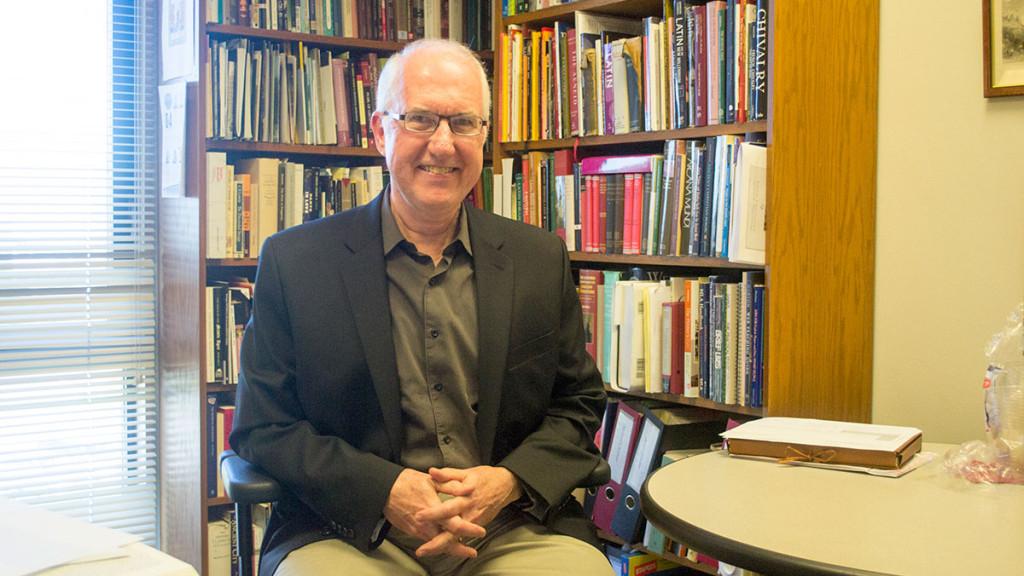Michael Twomey, retired Charles A. Dana professor of humanities and arts at Ithaca College, published an ecocritical essay based on medieval encyclopedias.
In his article, “The Exemplary Environment of Bartholomaeus Anglicus,” published in the book “Reading the Natural World in the Middle Ages and the Renaissance,” he argues that the allegories found in medieval encyclopedias helped to make up the Western ideologies of nature. He explained that nature should be used for spiritual reflection, not just for a place of physical habitation.
Twomey goes in-depth on medieval scholar Bartholomaeus Anglicus’ encyclopedia, “De proprietatibus rerum (On the Properties of Things).” Bartholomaeus’ work seems to cover everything in the world — plants, animals, people, languages and geographical locations. Through his article, Twomey explains what people did with this book, which, despite calling it an “encyclopedia,” was not used as such.
Before leaving the college in 2017, Twomey taught Literature of the Bible, specialized in medieval literature and created the college’s Latin program.
Staff writer Eva Salzman spoke to Twomey about his interest in medieval encyclopedias and experience writing this article.
This interview has been edited for length and clarity.
Eva Salzman: Could you give a brief summary of what your article is about?
Michael Twomey: Medieval writers were really big on taking material from other writers. I noticed that [Bartholomaeus’] favorite source … was another earlier encyclopedia by someone called Isidora Seville, who wrote his book in the year 636. So Bartholomaeus always used this book. And one big assumption about books like this one is that … people would use them for planting crops or hunting animals. So after I investigated that, what I realized was, no, people did not do that. I spent years looking at manuscripts of these books in England. … What I found was that nobody wrote notes in the margins of these books saying, ‘If you follow his instructions, you can plant crops.’ Instead, they wrote about other topics, usually the symbolic meaning of these plants, animals and so on. And then I began to realize that these … were books about the symbolic meanings of nature that people used to draw moral lessons. There’s lots of misinformation about deer in this book. You couldn’t possibly have hunted deer with it. So it’s really about something else — the sort of a personality trait that they projected onto deer — which then became something that was actually very human. And that’s the ultimate point, that these books are highly anthropocentric. These are books really about us. And so the last question that I had, which I addressed in the conclusion of this article is, what’s the implication of that when we translate nature into nothing but metaphors and similes and allegories that are not about nature but about us? So the final point that I made in the article is that this is a step along the way to seeing nature merely as instrumental, as something that has a personal or rather a social human meaning, but we don’t care about what nature is in and of itself. So I see this as a part of a dangerous trend in the human relationship with nature.
ES: What other pieces have you published?
MT: Well, the book itself, [the] encyclopedia, was last published in the year 1609. So I’m part of a team that is based in Germany and Belgium, which is slowly producing a modern edition of this text. … I’ve written, I don’t know, half a dozen articles about this encyclopedia going back to 1988, so, altogether, maybe a dozen articles on medieval encyclopedias. And then the rest of the stuff that I published is about medieval literature, usually the legend of King Arthur, which is completely different.
ES: What inspired you to not just write this but become a part of that team and work so hard in this? Have you always been interested in this topic?
MT: My dissertation director was working on a book about medieval imagery. He asked me to write a chapter about these medieval encyclopedias. I didn’t know anything about them at all. But he just dropped this out of the sky. So I wrote the chapter after a lot of research, and the book got published. And then I discovered that people started calling this chapter that I wrote an authoritative, standard particle about medieval encyclopedias. I started getting invited to give papers at conferences. So that became my thing.
ES: Although you’ve explained that your article is aimed toward professional medievalists, could somebody that isn’t as informed on the topic read it?
MT: One of the things that I’m really concerned about is breaking out of the academic box and being able to talk to people who are not academics. What I’ve seen in my profession is this tendency to academicize everything. So when I got interested in ecocriticism about 10 years ago, … I thought it would be a way to reach the general public so we could say things about the past that would teach us how we got to where we are now. I’ve been very disappointed, actually. It’s hard to do that because, in the academic world, a lot of publication is kind of rigidly controlled so that it has to be academic and directed at an academic audience. One of the things I would like to figure out is how to take this work that I’m doing, make it accessible and then get it published so that the average person could read it.














